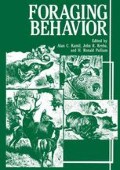Abstract
Current ecological theories of social organization rely on economic models to predict an individual’s rules for joining or leaving a group (e.g., Pulliam & Caraco 1984). These decision rules presumably are influenced by natural selection, so that variation in ecological circumstances might induce variation in sociality. For non-breeding individuals the propensity to join a group or remain solitary could depend on relative benefits and costs associated with avoiding predation (reviewed by Caraco & Pulliam 1984), meeting foraging requirements, or the interaction of these and any other factors affecting survival probabilities (e.g., Pulliam 1973, Caraco 1979, Barnard 1980).
Access this chapter
Tax calculation will be finalised at checkout
Purchases are for personal use only
Preview
Unable to display preview. Download preview PDF.
References
Axelrod, R., and Hamilton, W.D. 1981. The evolution of cooperation. Science, 211: 1390–1396.
Barnard, C.J. 1980. Flock feeding and time budgets in the house sparrow, Passer domesticus, L. Animal Behaviour, 28: 295–309.
Boswell, M.T., Ord, J.K., and Patil, G.P. 1979. Chance mechanisms underlying univariate distributions. In: Statistical Distributions in Ecological Work (ed. by J.K. Ord, G.P. Patil, & C. Taillie ), International Cooperative Publishing House, Burtonsville, Maryland, USA.
Brown, J.S., Sanderson, J.J., and Michod, R.E. 1982. Evolution of social behavior by reciprocation. Journal of Theoretical Biology, 99: 319–339.
Caraco, T. 1979. Time budgeting and group size: a theory. Ecology, 60: 611–617.
Caraco, T. 1981. Risk-sensitivity and foraging groups. Ecology, 62: 527–531.
Caraco, T., and Brown, J.L. 1986. A game between communal breeders: when is food-sharing stable? Journal of Theoretical Biology, 118: 379–393.
Caraco, T., Martindale, S., and Whittam, T.S. 1980. An empirical demonstration of risk-sensitive foraging preferences. Animal Behaviour, 28: 820–830.
Caraco, T., and Pulliam, H.R. 1984. Sociality and survivorship in animals exposed to predation. In: A New Ecology: Novel Approaches to Interactive Systems (ed. by P.W. Price, C.N. Slobodchikoff, & W.S. Gaud ), Wiley, New York, New York USA.
Charnov, E.L., Orians, G.H., and Hyatt, K. 1976. Ecological implications of resource depression. American Naturalist, 110: 247–259.
Clark, C.W., and Mangel, M. 1984. Foraging and flocking strategies: information in an uncertain environment. American Naturalist, 123: 626–641.
Goss-Custard, J.D. 1976. Variation in the dispersion of redshank (Tringa totanus) on their winter feeding grounds. Ibis, 118: 257–263.
Haigh, J. 1975. Game theory and evolution. Advances in Applied Probability, 7: 9–12.
Krebs, J.R., MacRoberts, M.H., and Cullen, J.M. 1972. Flocking and feeding in the Great Tit, Parus major L. - an experimental study. Ibis, 114: 507–530.
May, R.M. 1981. The evolution of cooperation. Nature, 292: 291–292.
Maynard Smith, J. 1978. Optimization theory in evolution. Annual Review of Ecology and Systematics, 9: 31–56.
Owen, G. 1968. Game Theory. Saunders, Philadelphia, Pennsylvania, USA.
Patil, G.P., and Joshi, S.W. 1968. A Dictionary and Bibliography of Discrete Distributions. Hafner, New York, New York, USA.
Pitcher, T.J., Magurran, A.E., and Winfield, I.J. 1982. Fish in larger shoals find food faster. Behavioral Ecology and Sociobiology, 10: 149–151.
Pulliam, H.R. 1973. On the advantages of flocking. Journal of Theoretical Biology, 38: 419–422.
Pulliam, H.R., and Caraco. T. 1984. Living in groups: is there an optimal group size? In: Behavioural Ecology: an Evolutionary Approach, 2nd edition (ed. by J.R. Krebs & N.B. Davies), Blackwell, Oxford, England.
Pulliam, H.R., and Millikan, G.H. 1982. Social organization in the non-reproductive season. In: Avian Biology, Volume VI (ed. by D.S. Farner, J.R. King, & K.C. Parkes), Academic Press, New York, New York, USA.
Pulliam, H.R., Pyke, G.H., and Caraco, T. 1982. The scanning behavior of juncos: a game theoretical approach. Journal of Theoretical Biology, 95: 89–103.
Ross, S.M. 1983. Stochastic Processes. Wiley, New York, New York, USA. Schaffer, W.M. 1978. A note on the theory of reciprocal altruism. American Naturalist, 112: 250–253.
Schaffer, W.M. 1978. A note on the theory of reciprocal altruism. American Naturalist, 112: 250–253.
Stephens, D.W., and Charnov, E.L. 1982. Optimal foraging: some simple stochastic models. Behavioral Ecology and Sociobiology, 10: 251–263.
Vincent, T.L., and Grantham, W.J. 1981. Optimality in Parametric Systems. Wiley, New York, New York, USA.
Author information
Authors and Affiliations
Editor information
Editors and Affiliations
Rights and permissions
Copyright information
© 1987 Plenum Press, New York
About this chapter
Cite this chapter
Caraco, T. (1987). Foraging Games in a Random Environment. In: Kamil, A.C., Krebs, J.R., Pulliam, H.R. (eds) Foraging Behavior. Springer, Boston, MA. https://doi.org/10.1007/978-1-4613-1839-2_12
Download citation
DOI: https://doi.org/10.1007/978-1-4613-1839-2_12
Publisher Name: Springer, Boston, MA
Print ISBN: 978-1-4612-9027-8
Online ISBN: 978-1-4613-1839-2
eBook Packages: Springer Book Archive

